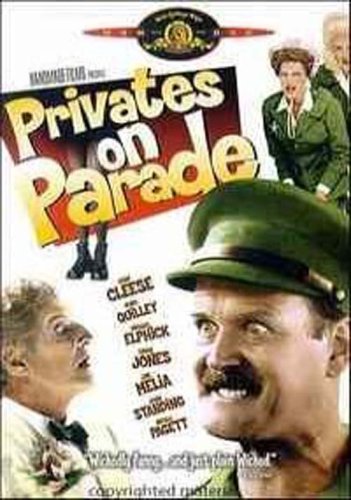
PRIVATES ON PARADE
UK, 1982, 107 minutes, Colour.
Dennis Quilley, John Cleese, Joe Melia, Nicola Pagett, Patrick Pearson.
Directed by Michael Blakemore.
Privates on Parade has been adapted from his own play by Peter Nichols. The original stage director, Michael Blakemore (who directed his first film A Personal History of the Australian Surf), has made the transfer to screen somewhat uneasily. There is much to enjoy, but it does not always work.
Dennis Quilley is excellently camp as Acting Captain Terri Dennis and Peter Nichols and Kenneth Williams have explained in various interviews how his real life counterpart operated in post World War Two Singapore and Malaya entertaining the troops. Other members of the cast including Joe Melia come from the stage version. However, the main introduction for the screen version is John Cleese as Major Flack. It is an excellent John Cleese role and he does it in typical fashion (including a gratuitous Funny Walk during the final credits).
The film is more serious than many of the British military films, from Dad's Army to The Virgin Soldiers. However, it has echoes of the British Carry On tradition. There are many excellent musical sequences which echo a variety of Hollywood musical film traditions. Patrick Pearson as the young hero and the excellent Nicola Pagett do a number of numbers including an echo of Fred Astaire and Ginger Rogers.
Peter Nichols wrote the tragic A Day in the Life of Joe Egg as well as the strongly satirical The National Health.
1. The success of the play? Successful transfer to screen? The musical comedy theatrical style? The light British military and Carry On tradition? The serious undertones? The blend of the serious and satirical work of playwright Peter Nichols?
2. Michael Blakemore's experience with the material on stage? His using many cinema styles for the transfer to screen? The use of so much of the dialogue, of the music and choreography? The use of stars like Dennis Quilley? The variety of cinema styles used from newsreel, Carry On farce, camp film style, theatricality and backstage stories, realistic war locations, echoes of Astaire Rogers and other musicals, choreography? The importance of the songs and their lyrics? The importance of satire? What was the audience left with at the end?
3. The technical competence of the film: the blend of realism and theatricality? Military camps, war missions? The Malayan jungle? Deaths and attacks? Post- World War Singapore? The contrived and narrow focus -of the theatre in this world? Terri Dennis' world? Major Flack's world? The satire at British traditional targets? The blend of the serious and the comic?
4. The audience entering via Steven? The young man, the background of England and his memories, his family and girlfriend? His interest in theatre? His first encounter with Terri and Len and the variety of types? The attraction towards Sylvia? Working with the group for rehearsals, the range of performances, the singing and dancing with Sylvia? His naivety about sex? The encounters with Sylvia and his not realising he was being manipulated by Reg? His growing sense of responsibility? His naivety about responsibility? His being used? The serious experiences of missions? Injury? Disillusionment? His reaction to Sylvia and the abortion? His return? Audiences identifying with him as the young hero? Critical of him yet liking him? Sharing his point of view? The ordinary young Englishman, the innocent abroad? Innocence to experience?
5. Audience enjoyment of traditional theatre material? The backstage comedy with the strongly camp tone? The treatment of war with the 'Oh what a lovely war' style? The theatrical background giving a comment to the theatricality and unreality of war? The various devices to highlight theatre: editing, pace, split screens, black and white photography, homages to various traditions: Terri Dennis' imitation of the Andrews Sisters, Vera Lynn, Carmen Miranda etc.? The patriotism of the Jungle Jamboree?
6. The ambiguity of the title? The camp tone? Terri and his straightforward camp? How much was a laughing at him? With him? His flamboyant style? The points made about homosexuality and relationships? Terri's assistance and the deeper relationships? Terri as character. caricature? Serious about living in his own theatrical world? His supporting Steven? His understanding Sylvia and his final gesture to support her? Len Bonney and his swearing, his work, his friendship with Charles? His part in the act? The military man? The confrontation with Reg? Death? Grief? Kevin and his whoring? Eric and his eccentricity? The composition of the group: masculine roles, feminine styles? The camp humour, the easy laughs? Point?
7. Eric and his ambitions, the fiancee, being sent up, injury?
8. The importance of Sylvia amongst the group? Her Eurasian background? Her part in the act? The Union Jack shorts etc.? Her proper style? Her relationship with Reg? The relationship with Steven? The pregnancy, using Steven? The abortion? The voyage home and Terri marrying her?
9. Reg and Sholto and their manoeuvring of the group? The sense of realism, arms dealing and war? Yet the contrived world in which they lived? Reg's hold over Sholto? The arms deals, the gamble, the set-up, the feigned deaths, the raid? Reg's reappearance? A very serious theme and critical theme about war and the British?
10. John Cleese as Major Flack? Taking himself seriously, words of Empire that he mouthed, the fanatic religious statements, his puritanical attitudes, the Holy War against communists, his limited understanding of culture? His eccentricity, the exercises? The importance of religion and swearing? His gullibility? The tour? The postscript with John Cleese's Silly Walk?
11. A film of the '80s with memories of the '40s? The critique of Britain by hindsight? The distance from World War Two and the poking fun at it as well as the tribute? The history of Singapore after the war? East- West relationships? Britain and the end of Empire? Racism, prejudice? Themes of homosexuality and acceptance of homosexuality? The end of the film with the return home and the beginning of the postwar era?